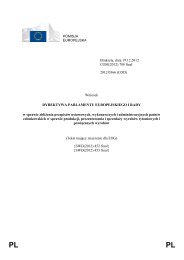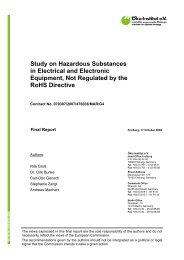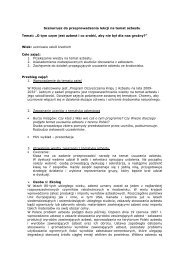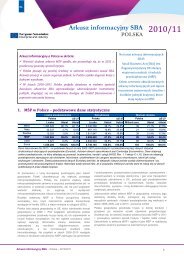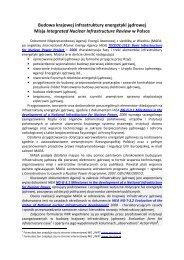Zielona księga w sprawie partnerstw publiczno-prywatnych i prawa ...
Zielona księga w sprawie partnerstw publiczno-prywatnych i prawa ...
Zielona księga w sprawie partnerstw publiczno-prywatnych i prawa ...
Create successful ePaper yourself
Turn your PDF publications into a flip-book with our unique Google optimized e-Paper software.
IV. COMMUNICATION FROM THE COMMISSION<br />
TO THE EUROPEAN PARLIAMENT,<br />
THE COUNCIL, THE EUROPEAN ECONOMIC<br />
AND SOCIAL COMMITTEE<br />
AND THE COMMITTEE OF THE REGIONS<br />
on Public-Private Partnerships<br />
and Community Law on Public Procurement and Concessions<br />
1. INTRODUCTION<br />
(Text with EEA relevance)<br />
Public authorities at all levels are increasingly interested in co-operating with the<br />
private sector when ensuring the provision of an infrastructure or a service. The<br />
interest in such co-operation, commonly referred to as Public-Private Partnerships<br />
(PPPs), is partly due to the benefit public authorities could have from the know-how<br />
of the private sector, in particular in order to increase efficiency, partly this interest<br />
is due to public budget constraints. However, PPPs are not a miracle solution: for<br />
each project it is necessary to assess whether partnership really adds value to the<br />
specific service or public works in question, compared with other options such as<br />
concluding a more traditional contract.<br />
Community law is neutral as regards whether public authorities choose to provide<br />
an economic activity them selves or to entrust it to a third party. If public authorities<br />
decide, however, to involve third parties in conducting an activity, Community law<br />
on public procurement and concessions may come into play.<br />
The main purpose of Community law on public procurement and concessions is to<br />
create an Internal Market in which the free movement of goods and services and<br />
the right of establishment as well as the fundamental principles of equal treatment,<br />
transparency and mutual recognition are safeguarded and value for money<br />
obtained when public authorities buy products or mand ate third parties with per<br />
forming services or works. In view of the increasing importance of PPPs it was<br />
considered necessary to explore the extent to which existing Community rules<br />
adequately implement these objectives when it comes to awarding PPP contracts<br />
or concessions. This should enable the Commission to assess whether there is a<br />
need to clarify, complement or improve the current legal framework at European<br />
level. To this end, the Commission adopted the Green Paper on Public-Private<br />
Partnerships and Community Law on Public Contracts and Concessions 62 on 30<br />
April 2004.<br />
62 COM(2004) 327 final, 30.4.2004.<br />
59





